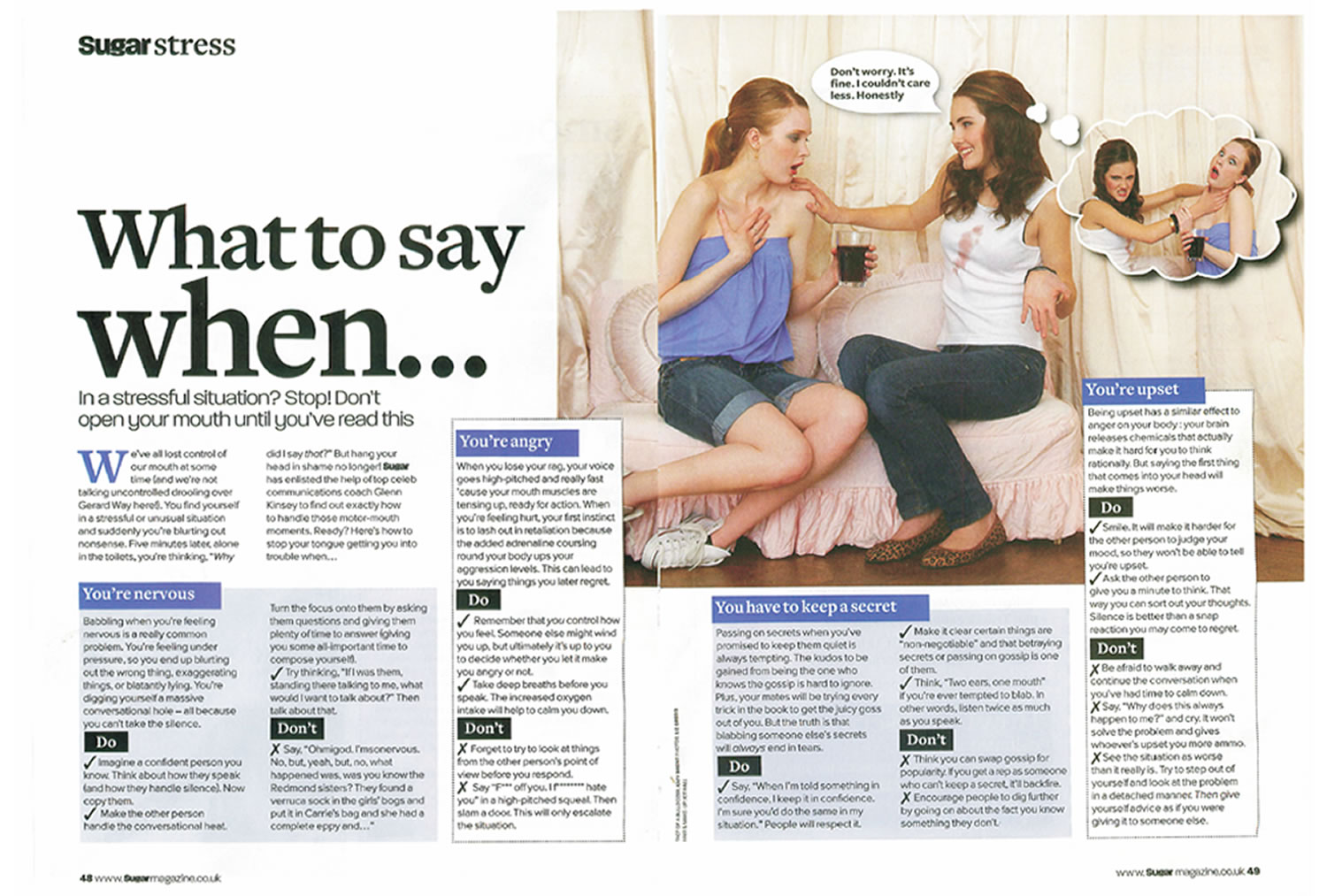Sugar, the top-selling teenage girls' magazine, turned to communications coach Glenn Kinsey for advice on handling stressful situations in its latest issue.
In an article entitled "What to say when...", the piece gave help to teenagers struggling with how to handle tricky motor-mouth situations.
The text of the article is outlined below and you can also view a PDF version by clicking the link:
Sugar Magazine - 'What to say when...' (699 KB)
What to say when...
In a stressful situation? Stop! Don't open your mouth until you've read this
By Katy Brent
We've all lost control of our mouth at some time (and we're not talking uncontrolled drooling over Gerard Way here!). You find yourself in a stressful or unusual situation and suddenly you're blurting out nonsense.
Five minutes rater. alone in the toilets, you're thinking, "Why did I say that?" But hang your head in shame no longer!
Sugar has enlisted the help of top celebrity communications coach Glenn Kinsey to find out exactly how to handle those motor-mouth moments.
Ready? Here's how to stop your tongue getting you into trouble when...
You're nervous
Babbling when you're feeling nervous is a really common problem. You're feeling under pressure, so you end up blurting out the wrong thing, exaggerating things, or blatantly lying. You're digging yourself a massive conversational hole - all because you can't take the silence.
Do
- Imagine a confident person you know. Think about how they speak (and how they handle silence). Now copy them.
- Make the other person handle the conversational heat. Turn the focus onto them by asking them questions and giving them plenty of time to answer (giving you some all-important time to compose yourself).
- Try thinking, "If I was them, standing there talking to me, what would I want to talk about?" Then talk about that.
Don't
- Say, "Ohmigod. I'msonervous. No, but, yeah, but, no, what happened was, was you know the Redmond sisters? They found a verruca sock in the girls' bogs and put it in Carrie's bag and she had a complete eppy and..."
You're angry
When you lose your rag, your voice goes high-pitched and really fast 'cause your mouth muscles are tensing up, ready for action. When you're feeling hurt, your first instinct is to lash out in retaliation because the added adrenaline coursing round your body ups your aggression levels. This can lead to things you later regret.
Do
- Remember that you control how you feel. Someone else might wind you up, but ultimately it's up to you to decide whether you let it make you angry or not.
- Take deep breaths before you speak. The increased oxygen intake will help to calm you down.
Don't
- Forget to try to look at things from the other person's point of view before you respond.
- Say "F*** off you. I f****** hate you" in a high-pitched squeal. Then slam a door. This will only escalate the situation.
You have to keep a secret
Passing on secrets when you've promised to keep them quiet is always tempting. The kudos to be gained from being the one who knows the gossip is hard to ignore. Plus, your mates will be trying every trick in the book to get the juicy goss out of you. But the truth is that blabbing someone else's secrets will always end in tears.
Do
- Say, "When I'm told something in confidence, I keep it in confidence. I'm sure you'd do the same in my situation." People will respect it.
- Make it clear certain things are "non-negotiable" and that betraying secrets or passing on gossip is one of them.
- Think, "Two ears, one mouth" if you're ever tempted to blab. In other words, listen twice as much as you speak.
Don't
- Think you can swap gossip for popularity. If you get a rep as someone who can't keep a secret, it'll backfire.
- Encourage people to dig further by going on about the fact you know something they don't.
You're upset
Being upset has a similar effect to anger on your body: your brain releases chemicals that actually make it hard for you to think rationally. But saying the first thing that comes into your head will make things worse.
Do
- Smile. It will make it harder for the other person to judge your mood, so they won't be able to tell you're upset.
- Ask the other person to give you a minute to think. That way you can sort out your thoughts. Silence is better than a snap reaction you may come to regret.
Don't
- Be afraid to walk away and continue the conversation when you've had time to calm down.
- Say, "Why does this always happen to me?" and cry. It won't solve the problem and gives whoever's upset you more ammo.
- See the situation as worse than it really is. Try to step out of yourself and look at the problem in a detached manner. Then give yourself advice as if you were giving it to someone else.
© Sugar Magazine






